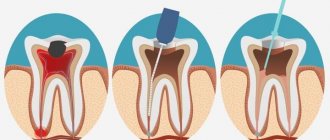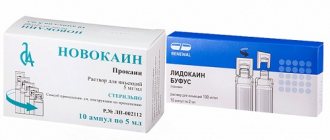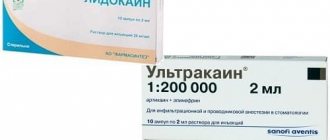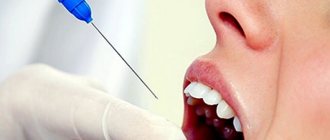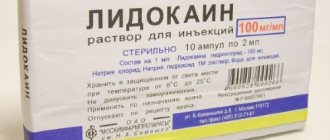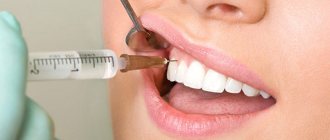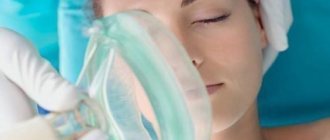Lidocaine
Lidocaine is a drug with antiarrhythmic and local anesthetic action, which is used in ophthalmology, minor surgery, and gynecology. Used in dental practice – it gives a pronounced analgesic effect. Available in ampoules, 10% spray, eye drops.
The medication is used in accordance with the instructions - deviation from the recommendations may lead to an overdose. The toxic effect of the drug extends to the cardiovascular and nervous systems and causes pathological symptoms.
Mechanism of action
The mechanism of action of Lidocaine is as follows:
- It stops nerve endings in cardiocytes and neurons, thereby providing an analgesic effect.
- Stabilizes membrane cells, thereby providing local anesthesia.
- Inhibits foci of excitation.
Lidocaine acts in two stages - at the first stage it reduces pain sensitivity, and after that it reduces active sensitivity. When administered intramuscularly, the effect of the drug appears within 8-10 minutes. If the product is used for local anesthesia, it begins to act in about half an hour.
If the drug is administered by infusion, it passes into breast milk, as well as through the walls of the placenta. This fact should be taken into account by pregnant women and mothers who are breastfeeding.
When Lidocaine is used by patients with chronic renal failure, it will accumulate in the body.
Contraindications for use
Like all medications, Lidocaine has contraindications for use. So, who is allowed to use the drug?
- Patients who are hypersensitive to the drug.
- Pregnant women, nursing mothers, children under 12 years of age.
- Persons who have previously had negative reactions to the use of lidocaine.
- Patients with impaired cardiac conduction.
- It is strictly forbidden to use Lidocaine in patients who have cardiogenic shock.
Description of the drug
"Lidocaine" is a drug that has a pronounced local anesthetic and antiarrhythmic effect. Producing countries: Russia, Belarus, Hungary, China, Germany. Available in various dosage forms:
- Lidocaine hydrochloride solution 1, 2 and 10% for parenteral administration,
- spray 10% in bottles with a dosed tip for topical use,
- "Lidocaine" 5% ointment for external use,
- gels for teeth with Lidocaine, which are available under different trade names,
- eye drops.
Lidocaine is available under various trade names:
- "Xikain"
- Gelicain,
- Dynexan
- "Versatis"
- Xylocaine.
In medical institutions, an injectable dosage form is used, as well as a spray. The permitted therapeutic dose per 1 hour should not exceed 300 mg. For spinal anesthesia, a maximum of 400 mg is administered. In cardiological practice, with drip infusion, the maximum daily dose is 2 thousand mg.
Mechanism of action
"Lidocaine" belongs to the pharmacological group "local anesthetic and antiarrhythmic drug class IB." Chemically it is an acetanilide derivative.
The mechanism of action of Lidocaine is as follows:
- blocks sodium channels of the membranes of cardiocytes and neurons,
- has a local anesthetic effect, which is explained by the stabilization of cell membranes, as a result of which impulse conduction is reduced,
- suppresses the automaticity of Purkinje fibers,
- inhibits ectopic foci of excitation by reducing the activity of areas that cause arrhythmia.
Lidocaine first reduces pain and then tactile sensitivity. At a therapeutic dose, it does not affect myocardial contractility. To relieve arrhythmia when administered intravenously, it acts quickly and briefly. When used intramuscularly, the effect occurs within 5–15 minutes. When applying the spray to the skin and mucous membranes, the effect develops after a quarter of an hour.
"Lidocaine" first enters organs with good blood circulation - the brain, heart, lungs. When infused, it penetrates into the placenta and breast milk. In chronic renal failure, the medication may accumulate.
Where is it used?
Aerosol "Lidocaine" is used for local anesthesia in various fields of medicine:
- when piercing the maxillary sinus and washing it, resection of nasal polyps,
- during tonsillectomy, adenomotomy, opening of paratonsillar abscess,
- during surgical procedures in dentistry,
- for anesthesia of the pharynx during insertion of a gastroduodenal tube and replacement of a tracheotomy tube,
- in gynecology during manipulations in the cervical area,
- in the treatment of superficial suppurative processes,
- before performing rectoscopy,
- when removing stitches.
It is used intramuscularly and intravenously in various fields of medicine:
- in cardiology during an attack of tachyarrhythmia, extrasystole, flutter, fibrillation,
- in case of myocardial infarction in case of rhythm disturbance,
- when implanting a pacemaker,
- in neurology it is used for myositis, vertebrogenic lesions of the spine,
- during epidural, conduction and superficial infiltration anesthesia.
In ophthalmology, eye drops are used for pain relief.
In surgery it is used to block nerve nodes and fibers.
Side effects
Patients tolerate Lidocaine aerosol well in most cases. Sometimes there is a burning sensation or a local allergic reaction. With general effects, the drug can depress or stimulate the central nervous system, as well as reduce the activity of the heart and blood vessels.
Systemic side effects of Lidocaine are as follows.
- On the part of cardiac activity, blockade, bradycardia, conduction disturbances, decreased or increased blood pressure are observed.
- The main disorders of the nervous system are euphoria, excitement or depression of consciousness, dizziness. In more severe cases, muscle twitching and cramps appear.
- Allergic reaction - urticaria, angioedema (Quincke's edema), anaphylactic shock.
- From the gastrointestinal tract, nausea or vomiting is observed.
Local phenomena are noted - a feeling of cold or heat, numbness of the limbs.
Contraindications
- The use of Lidocaine is strictly prohibited in case of hypersensitivity.
- A contraindication is a history of seizures following previous administration.
- The drug is not used for cardiac conduction disorders - blockades, weakness of the sinus node, Wolff-Parkinson-White syndrome.
- An absolute contraindication is cardiogenic shock.
- The use of Lidocaine is contraindicated for pregnant women, nursing mothers and children under 12 years of age.
What amount can cause an overdose?
There is no precisely established dose of the drug that could cause an overdose. It will be different in each individual case. This is why the lowest dose that produces lasting pain relief should be used.
The amount of solution used depends on the size of the area of tissue that needs anesthesia.
In adult patients, the maximum permitted dose for single transnatal use is determined at the rate of 5 mg per kg of body weight, but not more than 300 mg. The maximum permitted dose of the drug that can be used per day should not exceed 2000 mg.
For children, a maximum of 4 mg per kg of body weight is allowed per day. If the drug is administered intravenously, then no more than 1 mg per kg.
If for any reason the indicated doses were exceeded, then this could lead to an overdose, which has quite serious complications.
What amount will lead to an overdose?
Lidocaine overdose is one of the things that many people fear when they are offered this drug. Naturally, many people are concerned about the question: what amount can lead to an overabundance of the drug in the body. The required amount is calculated individually for each patient.
To avoid overdose (and maybe even death), it is recommended to use minimum levels, which will still cause a lasting analgesic effect.
In adults, the maximum for a single parenteral administration is determined by the formula 5 mg per kg of body weight, but the amount should not exceed 300 mg per hour. The maximum amount per day is 2000 mg.
The maximum dose of lidocaine in a child is 4 mg per kg of weight per day. For children under 3 years old, no more than 1.25 ml, no more than 4 times a day. If administered intravenously, then no more than 1 mg per kg of weight. If you exceed these doses, an overdose will develop.
As a rule, if you follow all the rules of use for local treatment of skin and mucous membranes, an overdose will not occur. But if it is used in such branches of medicine as dentistry, surgery, ophthalmology, obstetrics, etc., then caution must be exercised, because Lidocaine can accumulate in the body. And treatment will be required for its excess.
An overdose of the drug can occur in the following situations:
- If you are intolerant to the components of the drug;
- With increased sensitivity;
- When used on those areas of the skin where there is damage;
- When administered inside blood vessels;
- With accelerated absorption from the area where there is an increased number of vessels;
- When used for other purposes.
Overdose symptoms
In case of overdose, patients develop signs of inhibition of the heart muscle and central nervous system.
Symptoms of intoxication appear progressively, the severity of the symptoms gradually increases.
- The tongue becomes numb;
- Chills appear;
- The skin becomes pale;
- Sweating increases;
- Vision is impaired, a person may see double, the gaze cannot be focused;
- There is noise in the ears;
- There is a feeling of “crawling” in the area around the mouth;
- A drowsy state occurs, but in some cases, on the contrary, mental arousal may develop;
- Severe headache and dizziness;
- The muscles twitch involuntarily and tremors occur. In severe cases, seizures may occur that last from a few seconds to several minutes;
- The pulse decreases, and blood pressure also decreases;
- Breathing may suddenly stop for a while;
- The rhythm of the heart muscle is disrupted; if the poisoning is very severe, the heart may stop.
The risk of poisoning increases significantly if the drug was administered intravenously.
Acute poisoning with lidocaine during anesthesia (epidural and spinal) during labor can cause depression of the child’s heart rate, the development of hypotension and respiratory depression, even stopping it.
First aid
If the symptoms described earlier develop, you need to do the following:
- Stop administering the medication immediately.
- Lay the patient down and elevate his legs.
- In a room where a poisoned person is located, you need to open all the windows and unbutton clothes that restrict movement.
Since this remedy is not used for oral administration, there is no point in performing gastric lavage, using activated charcoal and laxatives.
Unfortunately, today there is no specific antidote.
When is medical help needed?
In case of Lidocaine poisoning, medical assistance is required in all cases, because the consequences of such intoxication are very dangerous - death from cardiac arrest.
Particular dangers when using the drug are caused by:
- Development of neurological signs (convulsive syndrome, increased agitation or, conversely, retardation, impaired consciousness, disorientation in place and time).
- Irregular heart rhythm, sharp drop in blood pressure;
- Respiratory dysfunction;
- Development of cyanosis of the epidermis and mucous membranes;
After first aid is provided, the patient is hospitalized in a hospital, where the following treatment is carried out:
- Drugs that have an anticonvulsant effect are injected into a vein;
- Plasma replacement drugs are used;
- Tracheal intubation is performed to attach the victim to a ventilator;
- When bradycardia develops, Atropine is used.
When is medical attention required?
If the symptoms of an overdose were mild, which did not greatly affect the patient’s condition, many people think that they have let it go. In fact, it is imperative to seek qualified medical care. After all, the effect may be delayed. And the results of an overdose of Lidocaine can be dangerous, and even fatal - cardiac arrest can occur later. Therefore, you need to do the following - consult a doctor.
And, of course, you shouldn’t put off visiting a doctor if you experience:
- Problems with coordination;
- Loss of orientation;
- Presence of inhibition;
- The pressure changed sharply, etc.
There is no need to delay, you need to go to the hospital directly in the ambulance that was called.
Hospital treatment
It also happens that an overdose of the drug may require hospital treatment. The victim is usually hospitalized immediately if his condition is of concern.
Ambulance doctors will take all necessary measures to eliminate the consequences of lidocaine poisoning, and then transport the victim to a medical facility. Further, specialized doctors will take care of his condition.
Consequences of overdose
Poisoning with this drug may have the following consequences:
- Impaired conduction inside the heart;
- Paralysis of the respiratory muscles;
- Development of allergies of varying severity, up to the manifestation of Quincke's edema;
- Development of collapse;
- Cardiac arrest, death.
Death can be caused by various reasons - if a person is allergic to the drug, if the dose is increased, or if the method of using the drug is violated.
If a person has intolerance to lidocaine, then death can occur as a result of anaphylactic shock, which occurs regardless of the amount of the drug ingested into the body.
Lidocaine overdose
Consequences of overdose and complications
An overdose of lidocaine is fraught with complications that may develop. Moreover, in most cases they will be sharp. Usually they all appear within the first day. Among the complications are:
- Respiratory arrest due to paralysis of the diaphragm - in this situation, immediate intubation of the lungs is required;
- Heart problems;
- A sharp drop in pressure;
- Deterioration or even complete cessation of blood supply to organs and systems of the body against the background of developed collapse.
Loading …
conclusions
In medical practice, Lidocaine is used everywhere. This is an effective pain reliever. But you need to understand that an overdose of it can cause serious health problems, and in some cases the person can die.
In order not to expose yourself to such a risk, all medical procedures should be performed in a hospital setting. Before using lidocaine, the doctor must ask the patient if he is allergic to the medicine.

